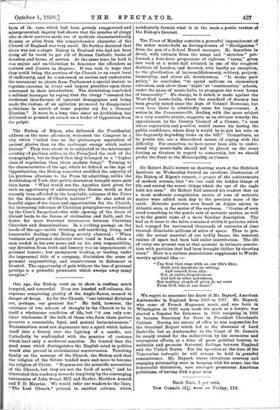The Bishop of Ripon, who delivered the Presidential address on
the same afternoon, welcomed the Congress to a city which "relied less on the picturesque reputation of ancient glories than on the exuberant energy which makes history." They were about to be subjected to the microscopic scrutiny of partisan critics in the Press,:and the rack of the stenographer, but he hoped that they belonged to a "higher class of vegetation than ,these modern fungi." Turning to the characteristics of the age, which he defined as the Age of Opportunities, the Bishop somewhat modified the asperity of his previous allusions to the Press by admitting, unlike the Archbishop of York, that public discussion brought more gain than harm. " What would not the Apostles have given for such an opportunity of addressing the Roman world as has recently been afforded in the hospitable columns of the Times for the discussion of Church matters ?" He also noted as hopeful signs of the times and opportunities for the Church, the increasing influence of Christian principles—as evidenced by the Czar's Encyclical—the wide opening of the doors of distant lands to the forces of civilisation and faith, and the desire for more fraternal intercourse between Christian Churches and denominations. In a striking passage on the needs of the age—noble thinking, self-sacrificing living, and 'honourable dealing—the Bishop acutely observed : " When business and personal character went hand in hand, when a man traded in his own name and on his own responsibility, any deviation from truth and honesty was an impeachment of personal honour ; but anonymous trading, or trading under -the impersonal title of a company, diminishes the sense of personal responsibility, and sensitiveness to dishonour is blunted. The opportunity of gain without the loss of personal prestige is a powerful persuasive which sweeps away many • scruples."






































 Previous page
Previous page